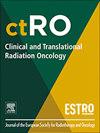Reirradiation − still navigating uncharted waters?
IF 2.7
3区 医学
Q3 ONCOLOGY
引用次数: 0
Abstract
With the emergence of high-precision radiotherapy technologies such as stereotactic ablative radiotherapy (SABR), MR guided brachytherapy, image guided intensity modulated photon and proton radiotherapy and most recently daily adaptive radiotherapy, reirradiation is increasingly recognized as a viable treatment option for many patients. This includes those with recurrent, metastatic or new malignancies post initial radiotherapy. The primary challenge in reirradiation lies in balancing tumor control against the risk of severe toxicity from cumulative radiation doses to previously irradiated normal tissue.
Although technology for precise delivery has advanced at a fast pace, clinical practice of reirradiation still mostly relies on individual expertise, as prospective evidence is scarce, the level of reporting in clinical studies is not standardized and of low quality − especially with respect to cumulative doses received by organs at risk.
A recent ESTRO/EORTC initiative proposed a standardized definition of reirradiation and formulated general requirements for minimal reporting in clinical studies [1].
As a consequence we found it timely to convene for an international and interdisciplinary meeting with experts in the field to summarize the current evidence, identify knowledge gaps and explore which best practices can be derived for safe reirradiation. The meeting was held on 15.06.2023 in Zurich and was endorsed by the scientific societies SASRO, DEGRO and ESTRO. Here, we report on available evidence and research priorities in the field of reirradiation, as discussed during the meeting.
再辐照--仍在未知水域航行?
随着立体定向消融放疗(SABR)、磁共振引导近距离放疗、图像引导调强光子和质子放疗等高精度放疗技术以及最新的日适应放疗技术的出现,再照射被越来越多地认为是许多患者可行的治疗方案。这包括初次放疗后复发、转移或新发恶性肿瘤的患者。再照射的主要挑战在于如何在肿瘤控制与先前已照射过的正常组织所受累积放射剂量的严重毒性风险之间取得平衡。虽然精确给药技术发展迅速,但再照射的临床实践仍主要依赖于个人的专业知识,因为前瞻性证据很少,临床研究的报告水平不规范且质量不高,尤其是在危险器官所受累积剂量方面。ESTRO/EORTC 最近的一项倡议提出了再照射的标准化定义,并制定了临床研究中最低报告水平的一般要求[1]。因此,我们认为召开一次由该领域专家参加的国际性跨学科会议是非常及时的,会议旨在总结现有证据,找出知识差距,并探索安全再照射的最佳实践。会议于 2023 年 6 月 15 日在苏黎世举行,并得到了科学协会 SASRO、DEGRO 和 ESTRO 的支持。在此,我们报告会议期间讨论的再辐照领域的现有证据和研究重点。
本文章由计算机程序翻译,如有差异,请以英文原文为准。
求助全文
约1分钟内获得全文
求助全文
来源期刊

Clinical and Translational Radiation Oncology
Medicine-Radiology, Nuclear Medicine and Imaging
CiteScore
5.30
自引率
3.20%
发文量
114
审稿时长
40 days
 求助内容:
求助内容: 应助结果提醒方式:
应助结果提醒方式:


